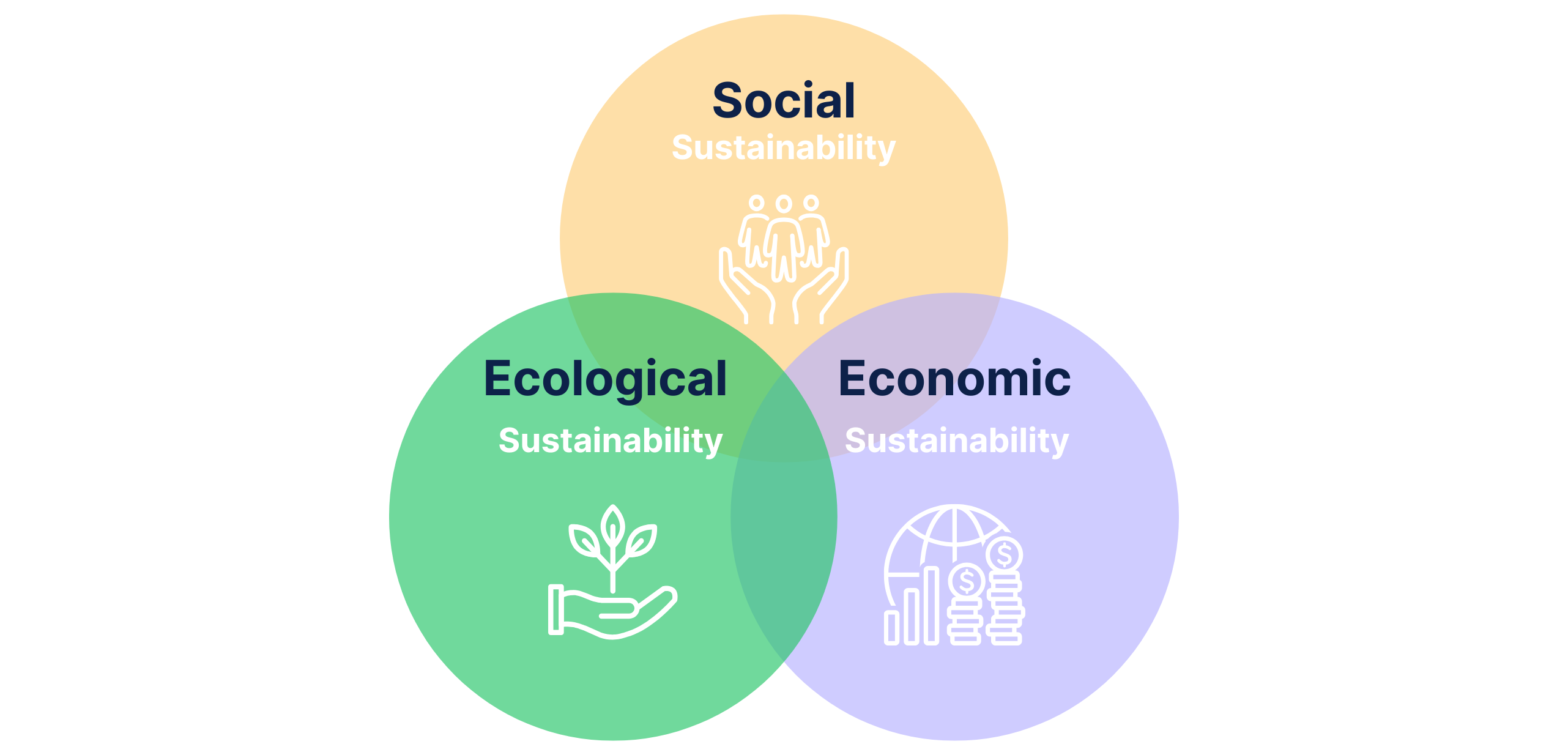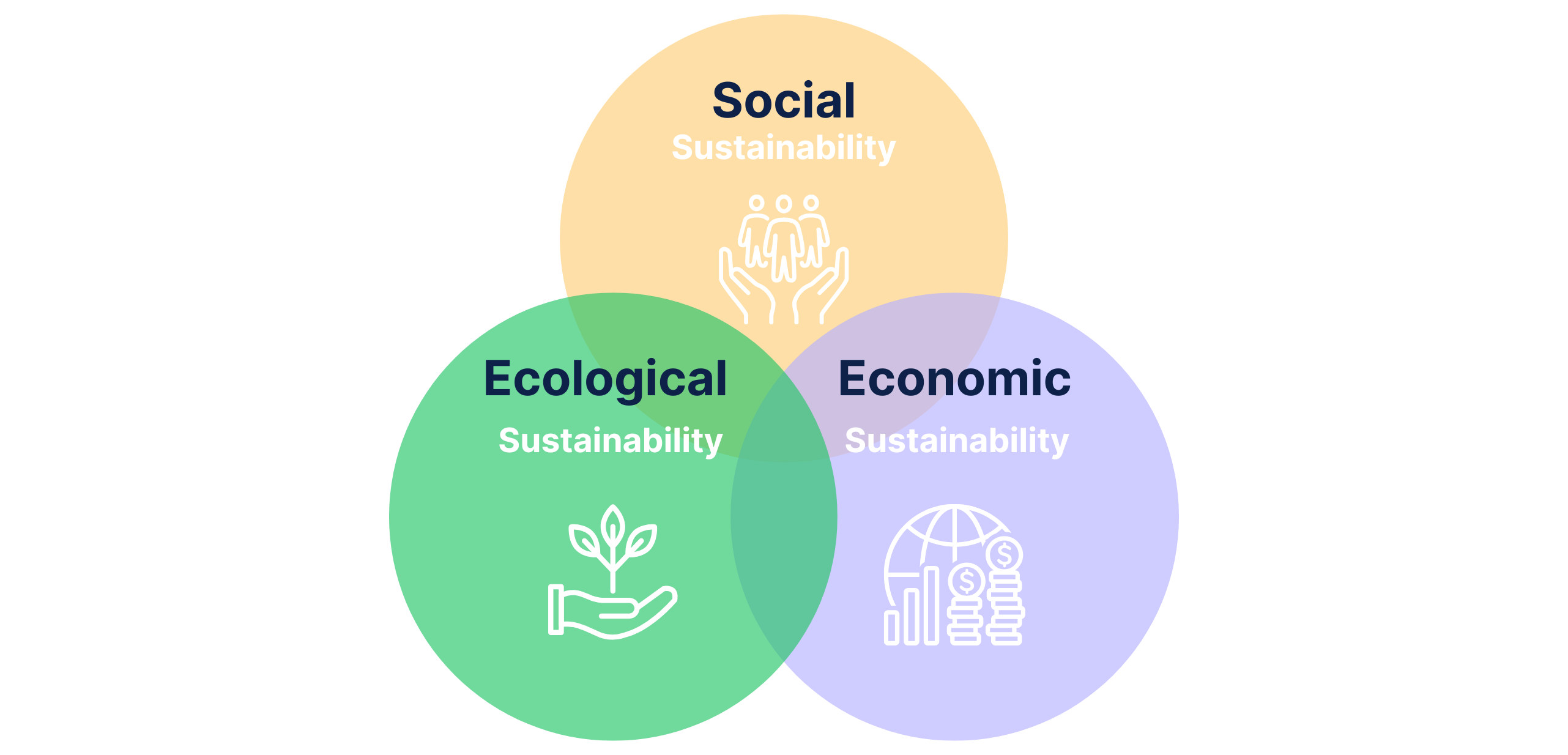As natural resources dwindle and climate change intensifies, businesses are prioritizing sustainability. Many turn to consultants to develop eco-friendly strategies and reduce their environmental and social impact. Sustainability consulting helps companies balance environmental, social, and economic goals—the "triple bottom line." Consultants craft green strategies, drive sustainability projects, and tackle issues like climate change, resource management, and social inequality. 🌍🌱
Unlike traditional consulting, this field blends business expertise with environmental and social sciences. It requires knowledge of policy, engineering, and economic factors.
In this article, we break down sustainability consulting: what it is, what skills you need, and how relevant the industry really is. Have fun reading!
The Key Role of Sustainability Consulting in the Transition to a Sustainable Future
At first glance, sustainable development has little to do with the consulting world, which is characterized by hard facts, figures, and efforts to optimize efficiency and increase profits. On the one hand, however, clients are demanding that companies behave in a more climate-friendly and conscious manner due to a gradual shift in societal awareness. On the other hand, businesses are also noticing that sustainable actions pay off in the long run. In these respects, sustainability consulting stands out because it plays a decisive role in the transformation of companies towards sustainable development. Economic, environmental, and social impacts on the company should be assessed and strategies developed to minimize these impacts. Ecological, economic, and social sustainability form the basis for this.
Sustainability Consulting provides companies with comprehensive expertise in the following areas:
- Environmental and social impact, taking into account the sustainability factor.
- Corporate social responsibility programs for the design of sustainable processes
- Sustainable design of the value chain
- Development of appropriate monitoring systems to oversee the measures taken
- Definition and regulation of communication policy
The Role of Sustainability Consultants
Sustainability Consultants play an important role in a company's identification and implementation of sustainability measures.
The following 4 steps are critical:
- Assessment and analysis:
Sustainability consultants usually start with a thorough analysis of the company's business practices and its entire value chain, analyzing their impact on the environment and society. You will identify optimized needs and develop tailor-made solutions. - Strategy formulation:
Based on the results of the analysis, the sustainability consultant develops company-appropriate solutions and strategies to close the sustainability gap and identify potential for improvement. These strategies include clear goals, metrics, and action plans to continuously improve the company's sustainability performance. - Implementation:
After the strategy is formulated, the next step is to implement it. They help integrate sustainable practices into different business areas, ensure that necessary resources are in place, and assist with employee training. In addition to implementing sustainable processes, this should enable the company to achieve long-term profitability and success. - Monitoring and reporting:
In the final step, the sustainability consultant supports the company in measuring, monitoring and documenting its progress. They support the preparation of sustainability reports and ensure that the information is transparent and reliable.
In addition to implementing sustainable processes, companies should also achieve long-term profitability and success.
An important aspect of sustainability consulting is raising employee awareness about the topic. Consultants conduct training and workshops to raise awareness of sustainable actions among company teams and encourage employees to adapt their work practices. They also help implement sustainability metrics and indicators to measure and monitor progress.
A Day in the Life of a Sustainability Consultant
But what does the work of a sustainability consultant look like on a day-to-day basis? Let's delve into the core activities that make up the role.
- Strategic Advice: A substantial part of a sustainability consultant's role is providing strategic advice to clients. For instance, they might assist a company in aligning their business model with the United Nations' Sustainable Development Goals (SDGs). An example of this is Unilever's Sustainable Living Plan, where the company aimed to decouple its growth from environmental impact while increasing its positive social impact. Consultants were instrumental in developing a strategy that included a comprehensive range of targets and commitments designed to contribute to the SDGs.
- Assessment and Analysis: Sustainability consultants often conduct assessments and analyses to understand a client's current sustainability position. This could involve carbon footprint analysis, life-cycle assessments, social impact evaluations, and more. For instance, a consultant might be tasked with calculating a company's Scope 1, 2, and 3 emissions as part of a carbon footprint analysis. They might also evaluate a company's environmental impact along its value chain, from sourcing raw materials to product disposal, using life-cycle assessment techniques. An example would be helping a major fast-food chain analyze and reduce its end-to-end carbon emissions, from farm to fork.
- Decarbonization Initiatives: After developing an emissions baseline and understanding the client's current sustainability operations, consultants collaborate with their clients to identify and develop new decarbonization initiatives to achieve the strategic objectives laid out initially. For example, consultants might work with a large automobile manufacturer to develop an electric vehicle strategy or help an energy-intensive industry like cement or steel plan and implement measures to capture and store their carbon emissions (CCUS). In section 2 we will see a detailed walkthrough on the various decarbonization initiatives.
- Stakeholder Engagement: Sustainability is not just an internal matter; it often involves multiple stakeholders, including employees, customers, suppliers, local communities, and government agencies. Therefore, consultants engage with these stakeholders to understand their perspectives, communicate plans, and progress, and negotiate potential conflicts or issues. Often, sustainability related matters are escalated all the way up to the Board of the companies - sometimes even constituting Board-level committees for sustainability related strategic decisions.
- Monitoring and Reporting: After implementation, consultants monitor the progress of the client's sustainability initiatives and prepare reports detailing their performance against set objectives. These reports provide transparency to internal and external stakeholders and can be crucial in demonstrating the business's commitment to sustainability.
To illustrate, let's consider the case of Shell, a large international oil company. Shell has announced that it would become a net-zero emissions energy business by 2050 or earlier. It is quite likely that the sustainability consulting team would have first conducted a thorough analysis of the company's current emission levels and then developed an integrated “green” strategy that would have encompassed areas like carbon capture and storage (CCS), nature-based solutions, and low-carbon fuel alternatives like green hydrogen. A sustainability consulting would have also effectively guided the company through the implementation of this strategy and created a reporting system with dashboard to track progress - thus demonstrating Shell's commitment to reducing its carbon footprint.
As we see from this example, sustainability consulting can have a profound impact, helping organizations not only reduce their environmental footprint but also save costs, improve their brand image, and create a competitive edge in the market.
Decarbonization and Sustainability Techniques
In sustainability consulting, a variety of techniques are used to help organizations reduce their carbon footprint and enhance their sustainability. Let's delve into these in more detail:
- Emissions Reduction: This is often the first step in a sustainability strategy. It includes reducing emissions from operations, energy usage, transportation, and more. For example, organizations may improve their energy efficiency, switch to electric vehicles for their fleet, or transition to lower carbon fuels for their processes.
- Renewable Energy: Transitioning to renewable energy sources is a key part of many decarbonization strategies. This can involve installing solar panels, wind turbines, or utilizing other forms of renewable energy such as geothermal or hydroelectric power. A prime example is Google's commitment to operate on 24/7 carbon-free energy in all its data centers and campuses worldwide by 2030.
- Green Hydrogen: Green hydrogen, produced by splitting water into hydrogen and oxygen using renewable electricity, is considered a key technology for achieving decarbonization, especially in sectors hard to abate with electrification alone, like heavy industries and aviation.
- Blue Hydrogen: Blue hydrogen is derived from natural gas through steam methane reforming (SMR), where the carbon emissions are captured and stored (CCS) or utilized (CCU). It serves as a lower-carbon alternative to natural gas and can serve as a transition fuel in the path to a low-carbon economy.
- Carbon Capture, Use, and Storage (CCUS): CCUS technologies capture carbon dioxide emissions from point sources like power plants or industrial facilities, transport it (usually via pipeline), and either use it for another process (like enhanced oil recovery or creating synthetic fuels) or store it underground in geological formations. This technology can effectively reduce carbon emissions from fossil fuel-dependent industries.
- Energy Efficiency Improvements: Making processes and systems more energy-efficient can dramatically reduce an organization's carbon footprint. This can involve anything from upgrading lighting and HVAC systems to implementing energy-saving manufacturing processes.
- Forestation and Reforestation: Planting trees to absorb CO2 from the atmosphere is a tried-and-true method of offsetting emissions. Companies can invest in forestation projects or sustainable forestry practices in their supply chains to offset their emissions. Different plantation species have different carbon absorption rates. Mangroves, for example are one of the densest carbon-offsetting plants. It is important to note that offsetting does not deal with the ongoing emissions in any way. If not implemented correctly, it can also lead to accusations of green washing.
- Carbon Credits: In addition to forestation projects, companies can purchase carbon credits from certified projects that reduce or remove greenhouse gases elsewhere. This can range from renewable energy projects to methane capture at landfills and even forestation projects sponsored by other parties such as the Trillion Tree Campaign.
- Circular Economy Initiatives: This involves changing the business model to design waste out of the system, keep materials and products in use for as long as possible, and regenerate natural systems. Companies like Philips and Renault have adopted product-as-a-service models where they retain ownership and responsibility for the product throughout its life, encouraging design for longevity, repairability, and recyclability.
- Sustainable Supply Chains: Implementing sustainability measures within the supply chain, such as sourcing materials from sustainable providers or reducing the carbon footprint of logistics operations.
These are just a handful of the myriad techniques and strategies that sustainability consultants may employ to help their clients achieve their sustainability goals. Each of these techniques has its unique challenges and advantages, and their suitability can vary greatly depending on the specific circumstances of the organization in question. In each case, consultants must carefully assess the situation, devise a comprehensive strategy, and work closely with the client to successfully implement it.
How to Make It in Sustainability Consulting?
While sustainability consultants share many skills and competencies with their counterparts in traditional management consulting, there are several key areas of knowledge and expertise that are particularly important or unique to the sustainability field. Here's a look at some of the key differentiators:
- Scientific Knowledge: While management consultants require an understanding of business and economics, sustainability consultants can do better with an additional foundation in environmental and social sciences. Understanding the complexities of climate change, the environmental impact of various industrial processes, or the nuances of renewable energy technologies can all be important parts of a sustainability consultant's job. This understanding can be obtained through formal education in related fields, continuous self-learning, or hands-on experience.
- Policy Familiarity: Sustainability consultants must stay updated with the latest policy developments related to environmental regulation, both locally and globally. This not only includes government policies but also industry standards and guidelines, such as those related to carbon offsetting or renewable energy. They need to understand how these policies impact their clients and how to navigate the complex policy landscape.
- Social Consciousness: More so than in many other areas of consulting, sustainability consultants need a deep understanding of social issues and a commitment to social equity. They often work on projects that have significant societal impacts especially related to environmental improvement and need to have a commitment to fairness and equity when coming up with solutions.
- Decarbonization Techniques: Decarbonization is a core part of many sustainability consulting projects. This requires an understanding of various techniques for reducing carbon emissions, from energy efficiency improvements to the use of renewable energy sources to carbon capture and storage. Consultants need to be aware of the latest technologies and strategies for decarbonization and understand how to apply them in different contexts.
- Sustainability Metrics and Reporting: Sustainability consultants must be familiar with the various metrics used to measure and report on sustainability performance. This includes understanding how to calculate carbon footprints, how to measure the social impact of business activities, and how to report on sustainability performance in accordance with industry standards and guidelines. Moreover, they also need to stay updated with the latest developments in this rapidly evolving field.
- Change Management: While change management is a key skill in all areas of consulting, it takes on a unique importance in sustainability consulting. Sustainability initiatives often require significant changes to business operations, supply chains, and corporate culture. As such, sustainability consultants need to be experts in guiding organizations through these changes and overcoming resistance.
The Benefits of Sustainability Consulting
- Expertise:
Sustainability consultants have in-depth knowledge and expertise in the field of sustainability to support companies in developing and implementing effective strategies. - Competitive advantage:
Companies that implement sustainable practices can differentiate themselves from the competition and increase their attractiveness to customers, investors, and employees. - Risk Management:
Sustainability consulting supports companies in identifying risks related to environmental impacts, social issues, or legal requirements and taking appropriate steps to minimize these risks. - Reputation and Credibility:
By using sustainability consulting, companies can improve their sustainability-related credibility and reputation and gain the trust of stakeholders.
Sustainability consulting plays a vital role in supporting companies and organizations on their way to a sustainable future. By helping companies identify sustainability goals, develop strategies, monitor performance, and engage stakeholders, sustainability consultants help drive positive change and promote sustainable transformation. In an era of growing demand for sustainable solutions, working with a sustainability consultant is a step in the right direction for companies committed to responsible and future-proof business.
Key Takeaways
While many of the skills required for success in sustainability consulting overlap with those needed in general management consulting, there are also several areas of knowledge and expertise that are particularly important for this field. By developing these skills and competencies, aspiring sustainability consultants can position themselves for success in this exciting and rapidly growing field. As for career paths, sustainability consulting can be a rewarding field with diverse opportunities. You could work in a specialized sustainability consulting firm, a sustainability-focused role within a traditional consulting firm, or even in-house within a corporation's sustainability department. You may also find opportunities in international agencies, non-profits, or government bodies focused on sustainability.
In conclusion, sustainability consulting is an exciting, growing field that blends business, science, and social impact. As we move towards a more sustainable future, the demand for skilled sustainability consultants will only grow. It's an excellent opportunity for those passionate about making a difference while working in the intellectually stimulating world of consulting.






